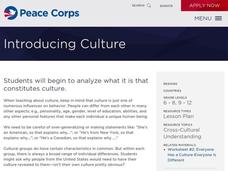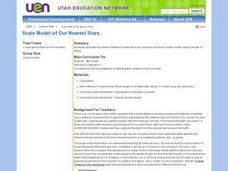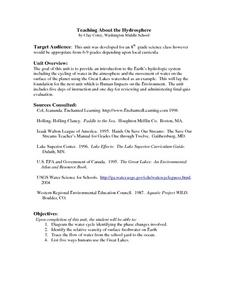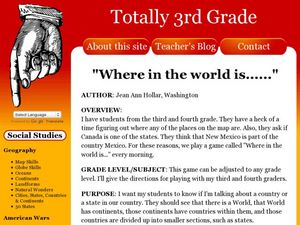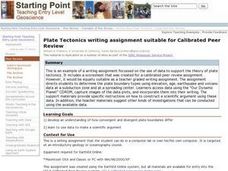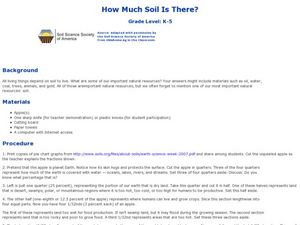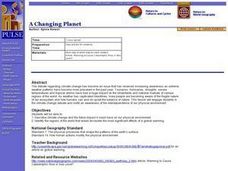Curated OER
Moons Of The Solar System
Learners investigate the solar system and its moons. They conduct research in groups to find information. Also the teacher uses models of the planets in order to teach different facts about the solar system through the use of...
Curated OER
Introducing Culture
Students analyze what it is that constitutes culture. They describe how the concept of culture relates to their own experience and imagine that they are extraterrestrials-peaceful, intelligent creatures from another planet who have...
Curated OER
Where in the World? Your Relative Location
In this geography worksheet, learners complete a graph showing their location on the planet earth. Students determine what percent of all people on Earth are on their continent, in their country and part of their town.
Curated OER
Ratios, Mars and the Internet
Students calculate real ratios that exist between the planets Earth and Mars. After a lecture/demo, students use worksheets and access Internet sites to do their calculations.
Curated OER
Time Machine: Evolution, Geology
Students are taken on a simulated "voyage" backward in time, to the beginning of our planet. They "witness" that beginning, the origin of life, and a number of key events from then to the present.
Curated OER
Gravity: It's GREEEAAATTT!
Students calculate effects of gravitational force on planets, discuss the effects of weightlessness on the human body and describe and demonstrate how objects in a state of free fall are accelerated by gravity at an equal rate.
Curated OER
Global Weather and the Greenhouse Effect
Students discuss how local weather patterns effect or relate to global weather and environmental changes, explore connected nature of our planet, and examine global weather patterns, their changes, and their possible connection to global...
Curated OER
Scale Model of Our Nearest Stars
Sixth graders calculate a light day, light hour, and light minute from the standard of a light year. After establishing the distances, a one meter scale is created to demonstrate the distance between the sun and the planets of our solar...
Curated OER
One World Ocean
Learners compare and contrast the properties of salt water in the oceans/seas and freshwater elsewhere on the planet. They also analyze mixing caused by currents in the ocean, including the effects of warm and cold water as well as with...
Curated OER
Teaching About the Hydrosphere
Eighth graders are introduced to the Earth's hydrologic system including the cycling of water in the atmosphere and the movement of water on the surface of the planet using the Great Lakes watershed as an example.
Curated OER
The North (Wall) Star
Students engage in a lesson which shows them that celestial navigation is the art and science of finding one's geographic position by means of astronomical observations, particularly by measuring altitudes of celestial objects - sun,...
Curated OER
Where in the World is...?
Students work in groups to locate an appropriate planet where inhabitants of a fictional place can be relocated. They create a PowerPoint presentation to introduce their relocation site, as well as ecosystem information about the site....
Curated OER
Adventure Into The World of Shapes
Young scholars view Elmer Holtzrichter's work Mystery Planet and discuss basic shapes and patterns. They create their own collage. and discuss the patterning they created. Students demonstrate how this pattern would sound with clapping...
Curated OER
Plate Tectonics Writing Assignment
Students complete a writing assignment focused on the use of data to support the theory of plate tectonics. They access data using the "Our Dynamic Planet" CDROM, capture images of the data plots, and incorporate them into their writing. T
Curated OER
Star Circles
In this star circles worksheet, students solve six problems given a diagram of a time-exposure photograph of the stars. Students determine the scale of the image, the location of the North Celestial Pole, they identify Polaris and they...
Curated OER
Ocean Pollution
Students explore ocean pollution. In this ecology lesson, students view a video entitled This Pretty Planet and identify common biodegradable products. Students participate in activities designed to simulate the negative effects of...
Curated OER
How Much Soil is There?
Young scholars examine that all living things depend on soil to live. In this science lesson, students pretend that an apple is planet Earth. Young scholars cut the apple to represent the portions of Earth with the last section...
Curated OER
Making Moths
Students study the Gregorian Calendar and its historical significance.In this calendar lesson students create a calendar design for an imaginary planet.
Curated OER
Out of This World Writing!
Miss Frizzle's class provides the inspiration for your young learners! Read "The Magic School Bus Explores Outer Space," and discuss the solar system. First learners will complete a KWL chart about a planet they're assigned to. Then, as...
Curated OER
Effects of the Sun on Our Planet (Grades 2-4)
Students observe how the sun's rays can cause evaporation and discuss its role in the weather cycle. They discover what the sun's energy brings to plants. They examine how different types of technology can enhance the amount of solar...
Curated OER
Space Tiling with Captain Planet
Fifth graders Apply the symmetry and angle properties of polygons, using symmetry and angle properties of polygons to solve practical problems. They study tessellates and explain why a shape tessellates.
Curated OER
A Changing Planet
Young scholars describe climate change and the future impact it could have on our physical environment. They identify the regions of the world that would encounter the most significant effects of a global warming.
Curated OER
Plate and Planet
Students investigate the health hazards of modern agriculture and how we can choose better food options. In this healthy eating lesson, students identify different indigenous people in photographs and discuss what they might eat....
Curated OER
How Does Flowing Water Shape a Planet's Surface?
Students investigate how flowing water influence landforms. In this earth science lesson, students observe water behavior as it flows from the stream table at various inclinations. They discuss whether water shaped Mars landforms or not.
Other popular searches
- Lesson Planet
- Planet Earth
- Inner and Outer Planets
- Worksheets Planets
- Paper Mache Planets
- Inner Planets
- Nine Planets
- Planet Earth Dvd Series
- The Planets
- Imaginary Planets
- Planet Acrostic Poem
- Laws of Planetary Motion



